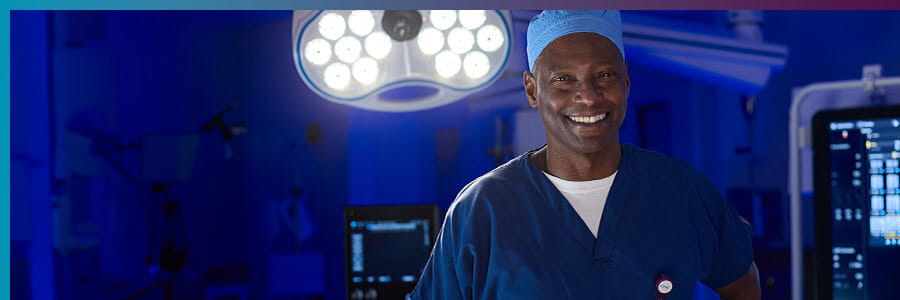Heart disease affects millions of Americans, ranking as the leading cause of death in the United States. A.J. Conrad Smith, MD, and the team at the UPMC Heart and Vascular Institute work to address that problem.
That work involves not only treating people with heart disease but also preventing others from developing it in the first place.
"The one end of the spectrum is caring for patients who are perfectly healthy and working together to keep them that way," says Dr. Smith, director, cardiac catheterization laboratories, UPMC Presbyterian, and medical director, UPMC Center for Heart Valve Disease.
"The other end of the spectrum is patients that don't have options from a surgical standpoint, patients that come in extremis, patients that have challenging, life-threatening illnesses. That's when the whole heart team concept really has its greatest strength."
The UPMC Heart and Vascular Institute team stretches across UPMC's entire footprint. It includes doctors, nurses, technicians, and many more people working together to help patients in need.
“We feel that our mission is to be able to take care of the sickest patients in the most efficient, most compassionate way, to get the best outcomes for those patients," Dr. Smith says.
In the cardiac catheterization lab, Dr. Smith treats many patients with severe heart disease. Some patients may not be candidates for surgery because of their age or other health conditions. Dr. Smith and his team develop catheter-based treatments for those patients.
One such alternative is the MitraClip®️, a surgical device that can help treat mitral valve disease without open heart surgery. UPMC was a pioneer in using the MitraClip — just one example of UPMC using advanced technologies for even the most complex patients.
"I think we pride ourselves in having a highly skilled team that has great experience," Dr. Smith says. "When patients come in with a combination of potential complexities to their disease, we have the capacity to find the right treatment for them and successfully employ that treatment so that there is a successful outcome."
For patients who don't have heart disease, the emphasis is on prevention. That involves education on healthy lifestyle habits — diet, nutrition, sleep, and more — along with regular heart screenings. Healthy lifestyle choices can help people lower their risk of heart disease, cancer, and other conditions, Dr. Smith says.
When Dr. Smith meets with patients, he treats them on an individual level. That means discussing their own specific case and providing them with the latest information to help them manage their heart health.
“When you come to me, my goal is to give you the most up-to-date information that is pertinent to you as a patient," he says. "So, it's really personalized care."
Heart disease affects people of all different races, sexes, genders, and ethnicities. But people in underserved communities often don't have access to care.
Dr. Smith and the team at the UPMC Heart and Vascular Institute are working to address gaps in care. They strive to provide culturally competent and equitable care to people of all communities.
“We have a very bright, engaged, and hard-working team that recognizes the challenges that each individual patient has," he says. "And I'm so happy and proud to say that patients routinely will say, 'When I came to UPMC, and everybody that I interacted with really seemed to care about how I did and how I was feeling, and they took really good care of me.'
"It's (recognizing) that we have that high level of scientific and medical capabilities, and we do it in a compassionate way."
At UPMC, Life Changing Medicine means delivering compassionate, high-quality care to all.
Find Care Near You























